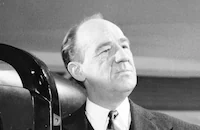Passport to Pimlico
Brief Synopsis
Cast & Crew
Henry Cornelius
Stanley Holloway
Betty Warren
Barbara Murray
Michael Hordern
John Slater
Film Details
Technical Specs
Synopsis
When an unexploded WWII bomb is accidentally detonated in Pimlico, an area of London, it reveals a treasure trove and documents proving that the region is, in fact part of Burgundy, France and thus foreign territory. The British Government attempt to regain control by setting up border controls and cutting off services to the area. The 'Burgundians' fight back...
Director

Henry Cornelius
Film Details
Technical Specs
Award Nominations
Best Writing, Screenplay
Articles
Passport to Pimlico
The jibes at British bureaucracy in Passport to Pimlico commence when an unexploded bomb accidentally goes off in a section of London and papers are unearthed revealing that the neighborhood actually belongs to the old kingdom of Burgundy. The locals quickly free themselves from post-war rationing, pub licensing laws, and other restrictions of government red tape. As the "Burgundians" become more fiercely independent; enforcing visa laws even on the subway that runs beneath their neighborhood; they are besieged by black marketeers and British bureaucrats, who keep passing the buck around while drinking endless cups of tea. Freedom from the restrictions of late 40s England was a notion that appealed to audiences, and the movie quickly became a hit.
The idea for the story came to Clarke after reading an article about how Princess Julianna of the Netherlands, exiled to Canada during the war, was about to have a baby, causing great consternation because the potential heir to the throne would be disqualified by being born on foreign soil. To solve the problem, the Canadian Parliament passed a law making the room in which the birth was to take place Dutch territory. Clarke found in the idea a rich source for poking fun at the government. Although not as lethally satirical as Ealing's other hits of 1949 (Kind Hearts and Coronets and Whiskey Galore), Passport to Pimlico gave its audiences comic relief from postwar burdens, while painting a picture of a society free of restrictions as ultimately chaotic and anarchistic, a "spiv's" (thief's) paradise," as Holloway calls it. In the end, the territory is returned to the Crown, and as an outdoor celebration of the reunification begins, the traditional English rain falls on the crowd, signaling a return to dreary but safe normalcy.
Director Henry Cornelius left Ealing after this film, his first directorial effort. He's probably best known for another delightful English comedy classic, Genevieve (1953), produced for the Rank Organisation and set during the London-to-Brighton antique car rally.
Director: Henry Cornelius
Producer: Michael Balcon
Screenplay: T.E.B. Clarke
Cinematography: Lionel Banes, Cecil Cooney
Editing: Michael Truman
Original Music: Georges Auric
Cast: Stanley Holloway (Arthur Pemberton), Hermione Baddeley (Edie Randall), Margaret Rutherford (Prof. Hatton-Jones), Basil Radford (Gregg), Michael Hordern (Inspector Bashford).
BW-81m.
by Rob Nixon

Passport to Pimlico
Quotes
We always were English and we always will be English and it's just because we ARE English that were're sticking up for our right to be Bergundians.- Connie Pemberton
Blimey, I'm a foreigner.- P.C. Spiller
Trivia
At the start of the film a radio announcement mentions Latin music performed by "Les Norman and his Bethnal Green Bambinos", and in-joke referring to Ealing producer Leslie Norman. Bethnal Green was/is an unattractive area in the East End of London.



















